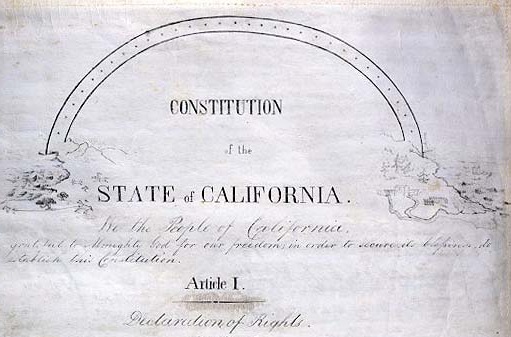
Downtown Sacramento from the Capitol building. (Photo: Norcal_kt, Shutterstock)
ACA 11: Abolishing the State Board of Equalization
ACA 11 requires the Legislature to create a state tax agency in its place
By Chris Micheli, March 13, 2023 3:56 pm
Assembly Constitutional Amendment 11 (Ting, Irwin, and Petrie-Norris) was introduced to abolish the State Board of Equalization (SBE) on January 1, 2026 and require the Legislature to create a state tax agency in its place. If approved by 2/3 of both houses of the Legislature, the measure would be placed before the statewide voters on the 2024 ballot.
Section 1 of the ACA would amend Article II, Section 14 to remove SBE members from the recall provisions and would make the amendments operative on January 1, 2026.
Section 2 of the ACA would amend Article III, Section 8 to remove SBE members from the “state officer” definition and would make the amendments operative on January 1, 2026.
Section 3 of the ACA would amend Article IV, Section 18 to remove SBE members from the impeach provisions and would make the amendments operative on January 1, 2026.
Section 4 of the ACA would amend Article V, Section 5 to remove SBE members from the state officer vacancy provisions and would make the amendments operative on January 1, 2026.
Section 5 of the ACA would amend Article V, Section 14 to remove SBE members from the conflict-of-interest provisions for state officers and would make the amendments operative on January 1, 2026.
Section 6 of the ACA would amend Article VII, Section 10 to remove SBE members from the libel or slander liability provisions and would make the amendments operative on January 1, 2026.
Section 7 of the ACA would amend Article XIII, Section 3 to remove SBE from the property tax exemption provisions, make numerous technical changes, and would make the amendments operative on January 1, 2026.
Section 8 of the ACA would amend Article XIII, Section 11 to remove SBE from the assessment provisions, make numerous technical changes, and would make the amendments operative on January 1, 2026.
Section 9 of the ACA would amend Article XIII, Section 17 to repeal the establishment and composition of the SBE effective January 1, 2026.
Section 10 of the ACA would add Article XIII, Section 17 effective January 1, 2026 to require the Legislature to establish a state tax agency by statute for purposes of carrying out specified powers, duties, and responsibilities that are currently granted to the SBE under the state Constitution.
The Legislature may vest these powers, duties, and responsibilities in a single state tax agency or separately. In addition, the Legislature would provide for the transfer of all employees serving in state civil service and all rights and property from the SBE to the state tax agency.
Section 11 of the ACA would amend Article XIII, Section 18 to remove SBE from measuring local assessment levels annually would make the amendments operative on January 1, 2026.
Section 12 of the ACA would amend Article XIII, Section 19 to remove SBE from annually assessing specified property and would make the amendments operative on January 1, 2026.
Section 13 of the ACA would amend Article XIII, Section 28 to remove SBE from the insurance tax provisions and would make the amendments operative on January 1, 2026.
Section 14 of the ACA would amend Article XIII A, Section 2.1 to remove SBE from the limit on property tax increases for primary residences and would make the amendments operative on January 1, 2026.
Section 15 of the ACA would amend Article XVI, Section 10 to remove SBE from Gann Limit provisions and would make the amendments operative on January 1, 2026.
Section 16 of the ACA would amend Article XX, Section 22 to remove SBE from the alcoholic beverage tax provisions and would make the amendments operative on January 1, 2026.
Section 17 of the ACA would amend Article XXI by deleting SBE from its heading and would make the amendments operative on January 1, 2026.
Section 18 of the ACA would amend Article XXI, Section 1 to remove SBE from the boundary line and census provisions and would make the amendments operative on January 1, 2026.
Section 19 of the ACA would amend Article XXI, Section 2 to remove SBE from the Citizens Redistricting Commission provisions and would make the amendments operative on January 1, 2026.
- Minors Enlisting in the Armed Forces - July 28, 2025
- Remote Marriage Licenses in California - July 27, 2025
- Legislative Policy on Bay Area Pilotage - July 26, 2025








“…Ting, Irwin, and Petrie-Norris…”
PERIOD -FULL STOP (to paraphrase our infamous Boy-Governor’s favorite expression…)
Two of these three have repeatedly shown themselves to be two-faced liars, and the third hyphenated entity is unproven, and probably trying to curry favor with the Party…
ONE question : WHY do they feel this is necessary???
Is Ting affiliated with the CCP???
Asking for a friend….
WHOA. – wait a minute here…
“Section 14 of the ACA would amend Article XIII A, Section 2.1 to remove SBE from the limit on property tax increases for primary residences and would make the amendments operative on January 1, 2026.
Section 15 of the ACA would amend Article XVI, Section 10 to remove SBE from Gann Limit provisions and would make the amendments operative on January 1, 2026.”
Is this effort to dismantle the State Board of Equalization a stepping stone to undermine Prop 13 property tax increase limitations???
I’m not familiar with the legalese minutiae of California legal jargon, but seeing these two paragraphs raised my political antennae…
Can Chris please weigh in on this???
The State Board of Equalization’s whole purpose is to oversee the equalization of tax revenue — from various locations throughout the state —- through its elected board members, yes? Such an enterprise is not meant to be centralized and that would be a bad thing for the taxpayer, am I on the right track so far? And yet that is what the state is attempting to do here…. correct? Why, exactly?! It DOES NOT look good. Not at all. Still learning about this, but it sure as heck looks like something that needs to GO DOWN. Big time.